Piano
Recitals
Should your child participate in piano recitals?
I want to share my personal experiences with recitals and performances. During my music education and extensive teaching career, I organized, participated, and performed in hundreds of these events.
Piano exams/recitals in my childhood
Before entering the music college, I studied piano for eight years in music school in Moscow. Every year I had to perform in two exams – one in the mid-term (in December) and another at the end of the school year (In May). These performances were tough challenges for all students.
In this picture, I am with my class at the Music School
(top row, third from the right). I am 9 years old.
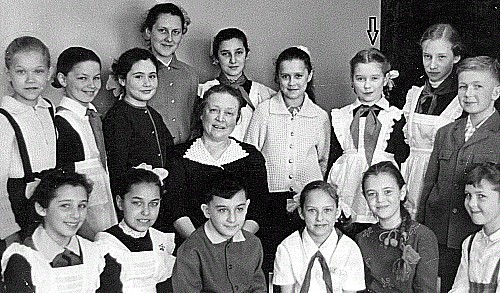
For these exams, we had to perform several pieces:
- Etude (the French word for study) by Czerny, Clementi, or Cramer
- Prelude or Invention by Bach
- Sonatina (for younger students) or Sonata (for older students) by Mozart, Haydn, Beethoven, or Scarlatti
- Composition by a Romantic composer such as Schumann, Chopin, Mendelssohn
- Composition by a Russian composer such as Glinka, Tchaikovsky, Rachmaninoff, Rimsky-Korsakov, Lyadov, Scriabin
- Composition by a Soviet composer such as Khachaturian, Prokofieff, Shostakovich, Kabalevsky.
As challenging as they were, these exams allowed us to learn music from different countries and times. We had to play on the stage in front of several piano teachers sitting at the judges’ table. No parents or other students were allowed to be in this big, beautiful, but scary (for us, young kids) hall.
Other students and some of their parents were waiting outside the hall. After we finished playing each piece, there was no applause, just complete silence. When each student completed the program, there was a few minutes break during which the teachers discussed this student’s performance. We had to wait for the results until all of us finished playing.
I had one “lucky” outfit, which I wore at every exam – a white blouse and dark blue pleated skirt. When I grew out of it, my mom made me a new one, which looked the same.
Finishing our grueling exam, we all went to the movies – it was our traditional reward. We even didn’t go home to change and just walked from the music school to the movie theatre. Our parents always knew where we were after the exam.
Piano recitals in my childhood
In addition to playing piano during these exams, we had to participate in piano recitals throughout the school year. This time, each one of us had to play just one piece chosen by our teachers. The auditorium was filled with parents, grandparents, relatives, and friends. All performers had to sit in the first two rows, away from the family.
After finishing his or her piece, each performer was rewarded with the loud applause. Whistling, shouting, or cheering was not customary at that time.
Performers received flowers from their families. As to the piano teachers, they all were drowning in the sea of flowers, presented to them by their students.
Exams at my Music College
After studying for eight years at the music school, I passed exams at the music college. In Russia, to be accepted to a musical college, you had to go through several entrance exams: piano performance, solfeggio, music history, Russian literature. If you passed the first exam, you could move to the next one. You will not be accepted into college if you fail even one of the entrance exams.
In college, we had the same kind of exams as in music school, but with the following additions:
- Scales. At this exam, we had to play any scale that our professors requested. We practiced all kinds and styles of scales because we never knew what we would be asked to play.
- Sight-reading. We had to sight-read any composition we were given just a minute before performing it in front of our professors.
- Accompaniment. We were requested to accompany a singer (one of the college voice professors), playing a song we were not familiar with.
- Duet. We had to perform a piano duet with another student.
- There were many other exams here and there as well. Our demanding professors scheduled some examination every single month for four years!
Piano recitals at my music college
While in college, we had regular opportunities to perform in public. We played in piano recitals in our college and at community centers (called “culture clubs” in Russia).
First piano recital of my students in the United States
The very first recital of my piano students was held in a small church in Los Angeles, in the middle of summer. It was two years after we emigrated from Russia to the United States. For this recital, I prepared twelve of my private piano students.
Since I never attended recitals of other piano teachers in the US, I tried to imitate the concerts in Russia. Each one of my students got to perform at least two or three pieces (one or two solo compositions, and a duet or two with me). This recital was held in July, but one of the songs played was ‘Silent Night.’
“Silent Night” in July
At that time I did not know any Christmas carols, but when I discovered the beautiful song called ‘Silent Night,’ I liked it so much that I assigned it to the student for the July recital. I do not know why the parents of this student did not stop me.
It was a Filipino family that lived in the USA for several years. Their three boys played in that recital. Of course, they all knew Christmas carols, but maybe they were too shy to advise the teacher, or they liked the ‘Silent Night’ as much as I did.
Piano recitals at my schools in Los Angeles and Florida
After that very first concert, I started having piano recitals twice a year – in December (with Christmas and Hanukkah music) and in June. When my private studio grew into “Prelude Music Studio” with a free-standing building on a busy street and ten piano teachers working there, we had about 10 to 12 recitals per year (5-6 in December and the same number in June).
In Boca Raton, where we had more than 600 students (half of them took music lessons), we scheduled 12 music recitals in May and in December. Students played piano, violin, guitar, drums, etc. Being the owner of the school, I had to organize and attend all these performances. By now I have several hundred recitals behind my belt.
Importance of playing by heart
I went to many recitals of other teachers where students performed boring music, played it by notes, and made tons of mistakes. Of course, this is not how the students should present themselves in the recital.
All solo pieces must be memorized. This tradition was started in the 19th century by the great Hungarian pianist and composer Franz Liszt. Before him, concert pianists performed in public, looking at notes.
It is much more difficult to express yourself if you have to look at your music all the time. If your hands have to move all over the piano, playing by notes will be difficult. As a piano student in music school and college, I was never allowed to play by notes during exams or recitals.
I looked at notes only during my concert-lectures on classical composers and styles of music. I played at such events at many country clubs and retirement communities. Altogether, I had about thirty concert-lectures, each of them included 20-25 compositions, and it would be impossible to memorize all those pieces. Also, the format of such concerts was different from the form of piano recitals.
Usually, I gave recital pieces to my students at the end of September for the December recital, and at the beginning of March for the May/June recital. Some challenging compositions needed more time to prepare. I assigned such pieces a month or two earlier.
It is essential that a student learns music by heart as soon as possible. Everyone gets nervous playing in recital, that’s why learning the piece by heart in advance takes away a big chunk of such nervousness.
My choice of recital pieces
My young students playing the duet at the piano recital[/caption]
If you attend enough recitals, you hear a lot of the same songs. The piano repertory is enormous, and there is no need to limit the choices. We do not have to listen to such popular but overused compositions as “Fur Elise,” “The Entertainer,” “Minuet in G by Bach,” “Twinkle, Twinkle Little Star,” “Main Theme from Swan Lake” ad nauseam. Hearing these pieces, again and again, makes listeners bored to tears.
I choose pieces which are famous and beautiful. Sometimes, though, I like to introduce the audience to something that they have never heard before.
I do not ask parents for advice on this matter. Never. And they are always pleased with my choices. Once, I had a piano student who wanted to prepare for entrance exams to “BAK Middle School of the Arts” in Palm Beach. This famous school specializes in music, theatre, and visual arts.
This girl’s father loved music, even if he did not play any instrument himself. He suggested that I gave the daughter his favorite pieces to prepare for BAK: “The Entertainer” by Scott Joplin and “Fur Elise” by Beethoven. I politely declined his suggestion.
Instead, his girl played two compositions which are heard quite seldom in the US: “Polonaise” by Polish composer Ogynsky (contemporary of Chopin) and March from opera “Ruslan and Ludmila” by Russian composer Glinka.
Also, I taught this girl how to play a very advanced style of scales which was way above that school’s requirements. I was not surprised when she was accepted to “BAK,” and a half-a-year later received a prize for being the best sight-reader in her class.
What about the stage fright?
To conquer the stage fright, try to perform your pieces by heart as often as you can. Play for your friends and family. If it is only one person listening to you, you already will feel more responsibility and get a little nervous. While playing when you are alone, you can imagine that you are in front of a hundred people. However, even one real person listening to you is better than a hundred imaginary people.
Should your child participate in piano recitals?
Yes, yes, and again yes! Participation in recitals is crucial for children’s musical development. By memorizing music, the students train and improve their memory, which is vital to brain development. Memory training is useful not just for music, but for school studies as well. Also, playing in front of others builds self-confidence, which is beneficial not only for successful music performances but also for children’s lives.
Should your child participate in piano recitals?
Yes, yes, and again yes! Participation in recitals is crucial for children’s musical development. By memorizing music, the students train and improve their memory, which is vital to brain development. Memory training is useful not just for music, but for school studies as well. Also, playing in front of others builds self-confidence, which is beneficial not only for successful music performances but also for children’s lives.
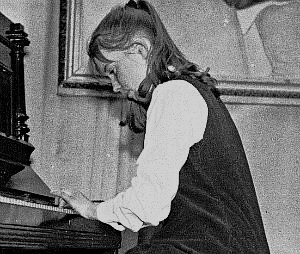
I perform at the Piano Recital
at the Musical College, Russia.
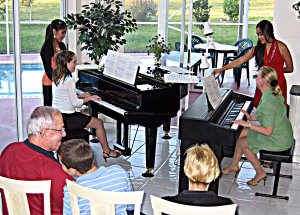
Piano Recital at my house
in Boca Raton, Florida
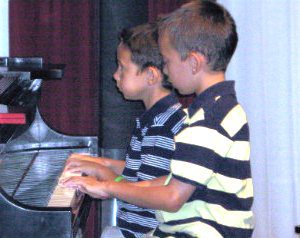
Piano Recital at my studio.
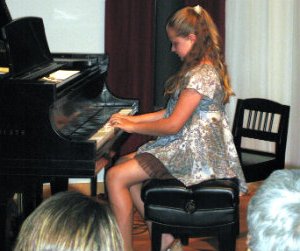
Piano Recital at my Studio.
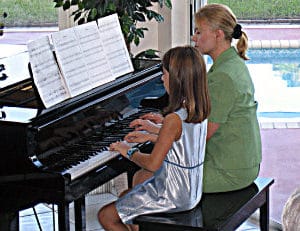
Playing duet at the Piano Recital.
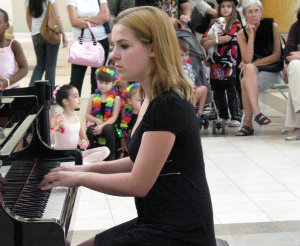
Playing piano at the shopping Mall
 ELENA MIGUNOV was born in Moscow, Russia. She earned a Bachelor of Arts degree and teaching credentials at the First Moscow College of Music. In 1979, Elena emigrated to the USA and founded PRELUDE MUSIC STUDIO, the largest and most successful music school in Los Angeles. Among Elena's students were children and grandchildren of many celebrities, including Gregory Peck, Lucille Ball, Shirley Jones, O.J. Simpson, John Candy.
ELENA MIGUNOV was born in Moscow, Russia. She earned a Bachelor of Arts degree and teaching credentials at the First Moscow College of Music. In 1979, Elena emigrated to the USA and founded PRELUDE MUSIC STUDIO, the largest and most successful music school in Los Angeles. Among Elena's students were children and grandchildren of many celebrities, including Gregory Peck, Lucille Ball, Shirley Jones, O.J. Simpson, John Candy.